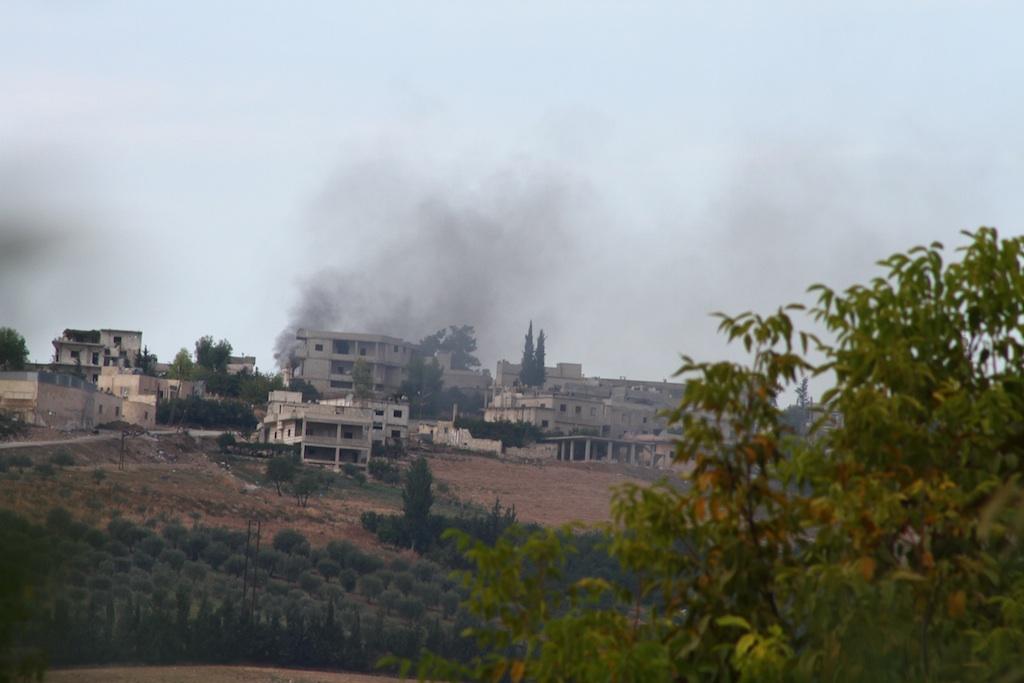HACIPASA, Turkey – Gunfire echoed in the valley throughout the evening on Friday. Blackouts due to the heavy fighting left the Syrian side in darkness, aside from the occasional spark from heavy weapons. Free Syrian Army fighters stood guard across the banks of the Orontes River, the natural borderline separating the group from their homeland. On the road behind them, Turkish soldiers in military vehicles and tanks patrolled the roads and fields.
That evening, opposition fighters had cornered 55 Syrian army soldiers along the border as they fled an FSA attack on the government-held border town of Azmiran. In an effort to escape, at least 10 government soldiers swam across the river, still armed, directly into the hands of Abu Zahed, an FSA leader who forms part of the command post based in Turkey.
“The Turkish authorities were right behind us, so we handed them over directly,” he said.
Locals say bullets and missiles from fighting between the Syrian government and opposition forces have been landing on properties along this border region for the past few weeks, as opposition forces have made a heavy push to take the border cities of Darkush, which was secured by the rebels Thursday, and now Azmiran. This was the first time the physical conflict had spilled onto Turkish soil.
Earlier on Friday, Abu Zaher and his men had been assisting refugees, including one woman injured by tank fire, to cross the Orontes by rowboat when a Syrian government helicopter began circling overhead. The refugees and FSA members took cover under the trees, watching through the branches as the aircraft flew almost directly overhead, dangerously close to Turkish airspace.
A second helicopter approached and the two surveyed the area for several hours, spraying sporadic fire on civilians and FSA positions on the Syrian side. When Turkish authorities deployed two F16 fighter jets, the aircraft quickly withdrew.
“I think Assad’s soldiers are trying to bring Turkey into the war,” said Abu Zahed. “They know Turkey supports us. They are angry.”
In the past few weeks, bombs fired from Syria have been landing in this area almost daily. Most of the spillover appears to be miscalculation, but when a shell made a direct hit on the Turkish town of Akcakale on October 4, killing five, the Turkish government stepped up their offensive. Tanks and armed soldiers heavily patrol these streets, occasionally returning fire over the border as a warning.
Turkish property owner Murat Rustoglu surveyed the Syrian mountains from the property that has been in his family for centuries. A loud explosion shook the ground as a new trail of smoke rose up from Azmiran, just across the border.
“The FSA have been attacking the village for three days. There have been many dead and wounded being brought across,” Rustoglu said, adding that his property has so far been hit by three rockets fired from the Syrian side.
“I was sitting on my property with the commander of the Turkish army yesterday when one hit this cotton field,” he said, pointing to a crop on the left.
The area of impact in Rustoglu’s cotton field is scorched, but Rustoglu said the commander assumed this one to be a miscalculation. Still, the army responded with a counter bomb, but in an isolated location.
As he picked up a stray bullet that landed a few meters away, Rustoglu said one rocket that landed in his olive grove very close to the town appeared to be deliberate.
As both sides use heavy weapons in an effort to control Syria’s borders, it is not possible to determine the origin of these shells, but Turkish locals and members of the FSA blame Syrian government forces.
As the search continued through the night on both sides of the border for the remaining 45 Syrian soldiers, Suheyl, a Turkish farm manager who was present at their capture, recalled the scene.
“They were very afraid, not just of the FSA but the Turkish authorities also,” he said. A roll of masking tape, which had been used to tie the captives, still hung from his wrist. “One of them was Alawite. Another keep begging that he had not killed anyone but just carried supplies. One said he had tried to run from the army but they shot him in the back and he was forced to return.”
Three of the men were injured. All ten were taken into Turkish custody for questioning. A further 15 soldiers were captured crossing back to the Syrian side shortly after. The whereabouts of 35 others remains uncertain as heavy fire continued and Turkish tanks heavily patrolled the border through the night.
